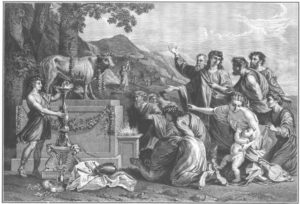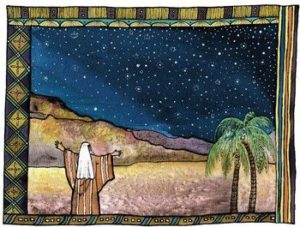From Deuteronomy 8-10
 Moses tells Israel they will conquer the nations in the promised land. But the LORD will not enable them to do this because of their righteousness. He will do it for the sake of His promise to their forefathers and because of the other nations’ wickedness. On the contrary their record showed they were stiff-necked and stubbornly resistant to God’s will. In the gospel God chooses sinners.
Moses tells Israel they will conquer the nations in the promised land. But the LORD will not enable them to do this because of their righteousness. He will do it for the sake of His promise to their forefathers and because of the other nations’ wickedness. On the contrary their record showed they were stiff-necked and stubbornly resistant to God’s will. In the gospel God chooses sinners.
This post is part of my bible in a year series.
Passage and Comments
In today’s passage Moses tells Israel they are about to cross over into the promised land and with the LORD’s help they will claim it as their own. Wary they might think these things will happen because of anything good of themselves. Moses has a few things to say.
9 “Hear, O Israel: you are to cross over the Jordan today, to go in to dispossess nations greater and mightier than you, cities great and fortified up to heaven, 2 a people great and tall, the sons of the Anakim, whom you know, and of whom you have heard it said, ‘Who can stand before the sons of Anak?’
3 Know therefore today that he who goes over before you as a consuming fire is the LORD your God. He will destroy them and subdue them before you. So you shall drive them out and make them perish quickly, as the LORD has promised you. (Dt 9.1-3)
‘Hear, O Israel’. This is a significant call to attention for Israel that normally proceeds important statements (e.g. Dt 6.4-5).
‘Know therefore’. The people they will face are big and strong. But Israel will still win over them. They will wipe them out.
If you knew the LORD was going to do great things through you. How would you feel?
The people hearing this might become proud and think the LORD is doing this because of how great they are or what they have done for the LORD. So Moses says;
4 “Do not say in your heart, after the LORD your God has thrust them out before you, ‘It is because of my righteousness that the LORD has brought me in to possess this land,’ whereas it is because of the wickedness of these nations that the LORD is driving them out before you. 5 Not because of your righteousness or the uprightness of your heart are you going in to possess their land,
but because of the wickedness of these nations the LORD your God is driving them out from before you, and
that he may confirm the word that the LORD swore to your fathers, to Abraham, to Isaac, and to Jacob. (Dt 9.4-5)
‘Righteousness’. Moses expressly denies the LORD is bringing them into the land because of their righteousness. As we will see below Moses is about to go into their shared history with the LORD.
‘Wickedness’. Israel is not about to invade a land of innocents. The existing residents are wicked. They sin and worship idols. The LORD has judged them and is about to punish them.
‘Confirm the word’. The LORD is also being faithful to his covenant promises to their forefathers. He is removing the inhabitants from the land and giving it to Israel because of his word to Abraham, Isaac and Jacob.
6 “Know, therefore, that the LORD your God is not giving you this good land to possess because of your righteousness, for you are a stubborn people.
7 Remember and do not forget how you provoked the LORD your God to wrath in the wilderness. From the day you came out of the land of Egypt until you came to this place, you have been rebellious against the LORD. (Dt 9.6-7)
 ‘Righteousness’. Exempting Joshua and Caleb, Israel has been in rebellion against the LORD since he rescued them from Egypt provoking the LORD’s wrath.
‘Righteousness’. Exempting Joshua and Caleb, Israel has been in rebellion against the LORD since he rescued them from Egypt provoking the LORD’s wrath.
There is nothing in the way Israel has behaved that has motivated the LORD into giving them the land. Quite the opposite. They do not deserve it in any way. They have repeatedly angered the LORD.
Moses goes on to refer to their dealings on the way to Horeb, the incident of the golden calf and their rebellion in Taberah (Num 11.1-3), Massah (Ex 17.7) and Kibroth-hattaavah (Num 11.34).
Its important to note this was their behaviour after being rescued, not just before.
25 “So I lay prostrate before the LORD for these forty days and forty nights, because the LORD had said he would destroy you. 26 And I prayed to the LORD, ‘O Lord GOD, do not destroy your people and your heritage, whom you have redeemed through your greatness, whom you have brought out of Egypt with a mighty hand.
27 Remember your servants, Abraham, Isaac, and Jacob. Do not regard the stubbornness of this people, or their wickedness or their sin, 28 lest the land from which you brought us say, “Because the LORD was not able to bring them into the land that he promised them, and because he hated them, he has brought them out to put them to death in the wilderness.”
29 For they are your people and your heritage, whom you brought out by your great power and by your outstretched arm.’ (Dt 9:25–29)
There are several reasons why the LORD continued to bear with Israel.
‘I lay prostrate’. In several cases Moses interceded on Israel’s behalf so the LORD would not destroy them. Moses is one example of intercessory prayer in the OT as other prophets were. He reminds the LORD of the amount of effort he had already expended in their lives as an incentive to continue persevering.
 ‘Remember’. Moses reminded the LORD of their forefathers. The LORD’s good relationship with them is intended to promote a further relationship with their descendants.
‘Remember’. Moses reminded the LORD of their forefathers. The LORD’s good relationship with them is intended to promote a further relationship with their descendants.
‘Lest the land’. Moses say the LORD will be shamed in the eyes of the existing inhabitants of the land if he does not follow through with his promise. They will not think he destroyed them because they were rebellious, rather because He was too weak to bring them in. The LORD’s honour is at stake.
‘Your people’. Lastly, Moses again encourages the LORD to regard Israel as his people. The LORD at times has disowned them when they have sinned against him (e.g. Ex 32.7-10; cf. Hos 1.9).
Story of Israel

The LORD follows through with his word and hands over the promised land to Israel. Despite the LORD’s grace and mercy, Israel still persisted in sinning and angering the LORD. Eventually the LORD judged and punished Israel and Judah . Like the nations before them he destroyed Israel and sent Judah into exile.
Story of Jesus
It might be easy to assume Israel is a good example of God’s people now and that we are no different to Israel after we have been called. That would be reading to much into the account.
Not all Israel is Israel (Rom 2.25-29; 9.6) and by their fruit you shall know them (Mt 7.16,20). That being said Jesus did come to save the lost as shown in his dealings with Zacchaeus.
5 And when Jesus came to the place, he looked up and said to him, “Zacchaeus, hurry and come down, for I must stay at your house today.” 6 So he hurried and came down and received him joyfully. 7 And when they saw it, they all grumbled, “He has gone in to be the guest of a man who is a sinner.”
8 And Zacchaeus stood and said to the Lord, “Behold, Lord, the half of my goods I give to the poor. And if I have defrauded anyone of anything, I restore it fourfold.”
9 And Jesus said to him, “Today salvation has come to this house, since he also is a son of Abraham. 10 For the Son of Man came to seek and to save the lost.” (Lk 19:5–10)
The LORD Jesus did not choose to save us for the righteousness we had done. God being faithful to his promises sent Jesus to die for us while we were still sinners (Rom 5.7-9).
Copyright © Joshua Washington and thescripturesays, 2016-18. All Rights Reserved.





